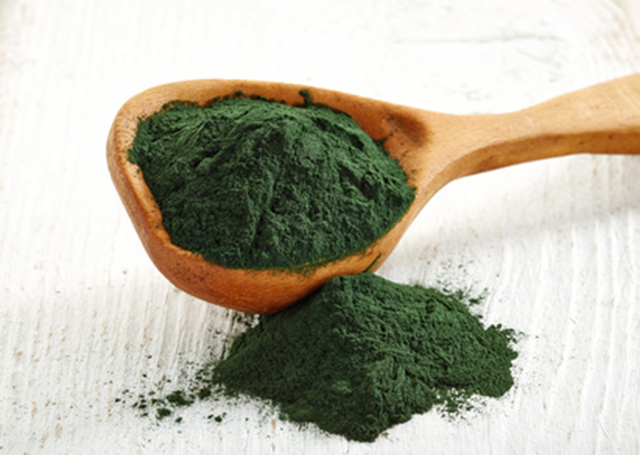10 reasons to eat spirulina.
Spirulina is often mistaken as an herb because of its nutritional benefits, but it is a cyanobacteria, which is a blue-green algae found in freshwater lakes, ponds, and rivers.
It is packed with potent health benefits.
Let’s take a look at 10 reasons to eat spirulina:
1. Anti-inflammatory:
One of the most important reasons to eat spirulina resides in the fact that it is an excellent source of Gamma-linolenic acid. It is a powerful anti-inflammatory agent.
Chronic inflammation is considered a major risk factor for serious diseases including arthritis, heart disease, cancer.
Inflammation also causes skin disorders such as psoriasis, eczema and acute rosacea.
2. Brain health:
One of the reasons to eat spirulina aand why you should include it in your smoothies is due to its antioxidants content. Spirulina provides potent anti-inflammatory benefits that may help the brain. In a study published by a journal called Experimental Neurology, dietary supplementation with spirulina was shown to reduce ischemic brain damage and possibly reduce the risk of stroke.
3. Detox benefits:
Spirulina is an excellent source of chlorophyll, which is one of nature’s most potent detoxification nutrients. It removes toxins from the blood, and binds with heavy metals, eliminating them from the body.
4. Digestive health:
This potent algae is a good source of dietary fiber, which is an essential nutrient for good digestion. Spirulina also promotes healthy bacteria in the gut, which aids digestion as well.
5. Eye health:
Spirulina is a good source of lutein and zeaxanthin, which are compounds that help reduce the risk of age-related eye diseases such as macular degeneration and cataracts. “These special pigments help protect your eyes from damage by slowing down ultraviolet-induced oxidation of lipid membranes, thereby helping prevent degeneration of your macula,” said Dr. Joseph Mercola, a leading health expert and physician.
6. Heart health:
There are many factors that contribute to heart health. Good cholesterol levels, blood pressure levels, and triglycerides are a few, and spirulina helps with all of them.
In a 2007 study from the National Autonomous University of Mexico, 4.5g of spirulina per day significantly reduced triglyceride levels, lowered LDL cholesterol, and reduced blood pressure.
7. Immune booster:
Spirulina is packed with antioxidants that help strengthen the immune system, promoting cell regeneration, faster wound healing, and quicker recovery from cold and flu.
8. Liver health:
Because spirulina has potent detoxification benefits, it can help get rid of toxins in the liver, promoting optimal liver health.
According to a study published in the Journal of Ethnopharmacology, spirulina has the ability to prevent non-alcoholic fatty liver disease.
9. May help fight cancer:
Spirulina is packed with antioxidants, which fight free radicals, a major risk factor for cancer. It also has potent anti-inflammatory properties, meaning it can help get rid of chronic inflammation, which is also a risk factor for many types of cancers.
10. May treat allergies:
Last but not least, if you are not convinced, one of the unique reasons to eat spirulina is due to its capability to treat allergies.
According to WebMD: “Allergic rhinitis, often called allergies or hay fever, occurs when your immune system overreacts to particles in the air that you breathe—you are allergic to them. Your immune system attacks the particles in your body, causing symptoms such as sneezing and a runny nose.” Spirulina may be effective against allergies. In a study of 127 people with allergic rhinitis, 2 grams of spirulina significantly decreased symptoms, including sneezing, congestion, itching, and nasal discharge.
TIP: Add 2 tbsp of spirulina powder to your favorite smoothie, juice recipe or glass of water.
You can also take it in a supplement form.
Note: None of the information in our website is intended to diagnose, treat, cure or prevent any illness or disease. The content on our website is for educational purposes only.
For the health benefits of spirulina.
For the health benefits of chlorella.
REFERENCES:
1. “Just 1 TBSP of Spirulina a Day: An Easy Way to Lower Your Cholesterol, Blood Pressure And…” Mercola.com. Mercola.com, 17 July 2011. Web. 05 Jul. 2015.
2. “Dietary Supplementation with Blueberries, Spinach, or Spirulina Reduces Ischemic Brain Damage.” Science Direct. Experimental Neurology, May 2005. Web. 05 Jul. 2015.
3. “Antihyperlipemic and Antihypertensive Effects of Spirulina Maxima in an Open Sample of Mexican Population: A Preliminary Report.” BioMed Central. Lipids in Health and Disease, 26 Nov. 2007. Web. 05 Jul. 2015.
4. “Suppression of Acute and Chronic Inflammation by Dietary Gamma Linolenic Acid.” National Center for Biotechnology Information. The Journal of Rheumatology, June 1989. Web. 05 Jul. 2015.
5. “Nutrition Facts and Analysis for Seaweed, Spirulina, Dried.” Self Nutrition Data. Self Nutrition Data, n.d. Web. 05 Jul. 2015.
6. “Studies on the Preventive Effect of Spirulina Maxima on Fatty Liver Development Induced by Carbon Tetrachloride, in the Rat.” Science Direct. Journal of Ethnopharmacology, Feb. 1999. Web. 05 Jul. 2015.
7. “Chemoprevention of Rat Liver Toxicity and Carcinogenesis by Spirulina.” International Journal of Biological Sciences. Ivyspring International Publisher, n.d. Web. 05 July 2015.
8. “Evaluation of Chemoprevention of Oral Cancer with Spirulina Fusiformis.” National Center for Biotechnology Information. U.S. National Library of Medicine, n.d. Web. 05 July 2015.
9. “The Effects of Spirulina on Allergic Rhinitis.” National Center for Biotechnology Information. U.S. National Library of Medicine, Oct. 2008. Web. 05 July 2015.

















